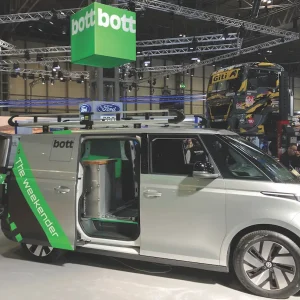When van fleet managers are asked to assess their job priorities, controlling costs will always be near the top of the list. Helping them to do this is something that ALD Automotive (ALD) set out to achieve with its Total Cost of Ownership Plus (TCO+) product – and it has proved a highly successful effort, with it winning the Innovation Award at the What Van? Awards 2023.
According to Russ Boulton, ALD’s commercial vehicle consultant, this award win was a just reward for the company’s hard work.
He said: “Being recognised in the LCV market for our innovative LCV proposition is exceptionally rewarding.
“Everyone on the team at ALD Automotive have worked exceptionally hard to take our LCV proposition to where it is today, so winning an award that recognises our hard work and celebrates the innovation in our product is the icing on the cake for what has been a phenomenal couple of years of development.”
While standard TCO (Total Cost of Ownership) assessments are commonplace, ALD’s service goes much further. Other services typically base their calculations on contracted mileage, maintenance, and rental finance. However, they ignore other factors, such as vehicle off-road downtime, which attracts costs including rental vehicle charges, loss
of revenue, driver downtime, and contract breaches.
TCO+ is based on a vehicle’s actual performance; physically, operationally, and financially. It includes the vehicle’s short and long-term reliability, based on the manufacturer’s performance records and in-life maintenance offering, and considers the cost of rental, insurance, fuel, and maintenance, combined with predicted in-life costs, vehicle off-road downtime and EV charging, in order to identify customers’ most suitable, most cost-effective vehicle-choices.
When asked why ALD had developed TCO+, Boulton explained: “TCO is a fantastic offering. However, when it comes to vans, it doesn’t consider the operational impacts that vehicle choices can have.
“For example, you could choose a cheap vehicle because of its TCO, but then find that in-life the downtime is so high that the associated costs with the vehicle being off the road erode the savings you made at the point of purchase.
“Plus, while standard TCO was fine for traditional powertrains, it wasn’t detailed enough to encapsulate the many variables of electric powertrains and nuances associated with the newer fuel type. So, we developed TCO+ to ensure our customers gained the best insight possible when transitioning to EVs.”
With electrification an ever-growing part of the van fleet landscape, the arrival of TCO+ is timely, as Boulton explained.
“EVs operate in a different way than ICE models. That makes it harder, when considering TCO, to keep in sight all the different elements and gain a full picture
on how to transition to electric. TCO+ allows you to see every element that a fleet needs to consider when pursuing electrification. Even more crucially, it also delivers answers.
“Of course, transitioning to electric doesn’t always mean buying an EV; it could be as simple as installing telematics. TCO+ produces a unique result for every customer, modelling over 20 different charging and journey scenarios, to help predict the cost and operational impact of public, home, and work charging (including downtime).
“By monitoring your vehicles and gathering data from telematics, you’ll understand your fleet and know how to implement effective changes. This is invaluable for future decision-making.”
Features of TCO+ include a vehicle selection module, which uses 30+ parameters – such as fuel type, payload, and load length – to refine vehicle choice, and dealership, driver, or depot mapping, which can demonstrate how different manufacturers’ dealership networks will perform for specific locations.
Other features include in-life reporting, which allows fleets’ historical data to inform future decisions, and EV charging assessments, giving an idea of likely future charging requirements.
TCO+ can also include telematics analysis, including analysis of daily vehicle journey profiles, drivers’ EV requirements, possible fleet electrification percentages, potential charger locations, optimum charging speeds, and public charger network mapping.
Benefits ALD’s customers have seen from TCO+ include saving money, a reduction in VOR downtime, more efficient operations, enhanced safety, and assistance with switching to EVs with resulting reductions in CO2 emissions.
Boulton said: “Our customers have received TCO+ exceptionally well. Every customer we’ve taken through the TCO+ process has come to a comfortable, confident and informed conclusion.
“With customers responding to TCO+ with quotes like ‘It has been instrumental in building a fleet that works for our company, as well as helped us choose vehicles that fit our goals’ and ‘TCO+ is how vehicle procurement decisions should be made, for sure,’ we’re confident that our customers come away with a robust road map that allow them to make big decisions off the back of our TCO+ findings.”
Having won the What Van? Award for innovation, we finished by asking Boulton if there were any further innovations from TCO+ and ALD in the pipeline.
He said: “There certainly are! We are always innovating and building on our propositions to ensure we’re delivering the best for our customers.
“It’s difficult to give full details, but we’re developing our journey profiling and how fuel cost can vary depending on vehicle choice or charging options is the next development.
“Again, we have taken a number of customers through the initial development of the tool, and it has – in the words of certain fleet managers – ‘blown their minds’.”





